- Home
- Kristen Simmons
Three Page 4
Three Read online
Page 4
I swiped at my arms again, feeling the tickle on my skin.
“Maybe they didn’t want to.” He chewed his bottom lip, looking into the room.
His words shifted my fear to something more solid, something stronger. I’d had it backward. These people hadn’t given up, they’d made their stand. Maybe that was all we really got: a choice to control our own fate.
“I hate roaches,” Sean was saying. “They’ll eat anything, you know. Glue. Trash. Fingernails. They even eat each other. Roach cannibals. Disgusting.”
Chase gave him a look. “Sean.”
“They can survive without their heads. I bet you didn’t know that.”
“Sean,” said Chase. “Let it go.”
“Right.”
Behind them something had caught my eye. On the floor, where the shoe had landed, a strip of silver peeked out from beneath the thin bedspread. Chase stepped aside when I gave his forearm a small squeeze.
“There’s something under the bed,” I said.
Sean, pale and damp with sweat and rain, gave a grunt and motioned toward the bodies.
“After you,” he said “I like my fingernails just fine where they are.”
Mouth pulled tight, Chase kicked the shoe out of the way and then swept his leg beneath the mattress, knocking out a tarnished silver box the size of a briefcase but twice as thick, with a combination lock. Roaches crawled up his legs and he hastily brushed them to the floor.
I asked, “What do you think it is?”
“Something good,” said Sean. “Otherwise it wouldn’t be locked.”
Chase knelt and tried to pry it open, but to no avail. The contents inside slid and clanked together as he carried it out into the hallway, where the stench was not so intoxicating.
“Maybe we should leave it,” I said, feeling suddenly like we were desecrating a tomb. Chase had kept a wooden box in his old house filled with memories of his life before the War: pictures of his family, his mother’s wedding ring, which I knew he still carried in his front pants pocket. The thought of someone rifling through his things like we were about to do here made something pinch inside of me, but it wasn’t enough to stop.
“No way,” said Sean, taking the case. He spun the tiny rusted numbers, but the box remained firmly closed.
Chase rubbed the back of his neck. “Might be something worth trading.”
“Might be something worth keeping.” Sean glanced up to where Rebecca was now peeking around the doorframe. “Pain meds or something.”
“Might be filled with more cockroaches,” I said. Sean’s hands snapped back. He gagged, and then reached for the case again.
“Just bugs,” he muttered. “Men aren’t afraid of bugs. Not even if they have tiny little heads and giant shiny bodies.”
Voices outside distracted us from our find and drew us to the front door, where a figure appeared in the rain. Though Jack waved from the garage, I was reluctant to step down into the driveway. The pack of dogs was still absent, but that didn’t mean I didn’t feel them, lurking in the shadows.
“Looks like they found something,” said Rebecca. She placed an assortment of cups she’d gathered from the kitchen on the railing, where each immediately began filling with rain water. I grabbed one and rinsed my mouth clean of the sour taste that had gathered there, grateful Rebecca had thought of it.
“They’re not the only ones,” I muttered.
Jack, grimacing against the weather, carried a wooden crate toward the house. It was heavy from the looks of it; he rested it against one hip as he heaved it through the rain. Billy followed, his T-shirt clinging to his pale, skinny chest. In our rush toward shelter, we hadn’t even thought to search the garage.
“Not bad, huh?” asked Billy, dropping his freight onto the warped deck. Inside the box were a dozen rusty cans of food. My eyes grew wide; my empty stomach rejoiced.
“It’s a Horizons truck,” said Jack. He didn’t seem happy about it. He didn’t seem happy about anything since Chicago had fallen—not that there’d been much to celebrate. “All the other houses on this street have been stripped clean.”
Rat was the last to arrive, an enormous green raincoat slung over his shoulders. He stroked the sleeves smugly.
“Can we drive it?” I asked. Rebecca could ride inside while we searched the beach.
“Not unless you have four spares,” said Billy. “The tires are flat.”
Chase scratched the back of his head. “The town’s cleaned out. What’s a supply truck doing here?”
“Who cares,” said Jack, puncturing a can of peaches with his knife. Rust crumbled off the top. The juice dribbled down his stubbly chin as he slurped up the contents.
“No, he’s right,” I said. “Why are we the first to find this stuff? It’s like it was restocked after the evacuation.” I’d never seen so much food left in one place. No one I’d met would leave a Horizons truck unchecked unless it had been guarded by government workers.
I glanced back toward the bodies on the bed and shivered.
“Maybe Wallace restocked it,” said Billy.
Chase and I shared a worried glance.
“He hijacked tons of Horizons trucks in Knoxville.” Though Billy shrugged, his eyes had brightened. “Maybe he knew we were coming,” he added quietly.
I wasn’t sure what to say. The cans had clearly been here for years.
“Or maybe he’s dead,” said Jack bluntly. He motioned toward the garage. “Didn’t I tell you to get that other box?”
I scowled at him as Billy slumped and headed back into the rain.
“What?” he asked. “Like you’re not all thinking it.”
“Shut up, Jack,” I said.
I didn’t know who had left the food, but it couldn’t have been the safe house survivors. They wouldn’t have had a chance to gather supplies before the bombs hit—they’d be scavenging, just like us.
“Looks like you found something, too,” said Rat. Behind me, Sean was in the midst of swinging the lockbox into the side of the house. It hit the side of the house with a thunk.
Just over his shoulder, beside the front door, was a single black metal number marking the address. It was coated with a thick layer of rust and corroded around the edges.
Three.
Chase nodded toward the door. “It was guarded by a couple of stiffs.”
Rat scrunched up his pointy nose. “Still juicy?”
“No,” I said, wanting to rid the image from my mind forever.
Sean shook the box, and from within came a metallic clatter. “I tried messing with the combination. Maybe we should just shoot it open.”
“Three,” I said aloud. The others paused, and faced me.
“There’s four numbers,” said Sean.
Chase saw what I had seen. “Then try zero, one, one, one. Or three zeros, and then a three,” he said.
Sean did. The latch clicked open.
Inside was a handgun and a box of ammunition. We all stared in awe for a full beat before Jack reached to retrieve it. He pulled back the slide; there was already a round in the chamber. The consequent click made me jump.
“Your pal stashed this here, too,” Jack told Billy, who’d returned with another box. “He’s inside waiting for you.”
Billy glanced through the door, red in the face. Chase gave the Chicago leader a hard look as Rat chuckled.
“Leave him alone,” Chase warned. His focus turned back to the gun. “Ember’s right, someone’s been here. Whoever left the gun did it recently.”
“Why do you say that?” Sean asked.
“The slide’s clean, no catch,” he answered. “Unless someone just wiped it down, there’s no way the dust and humidity wouldn’t have clogged the mechanism.”
Jack’s brows lifted. He tapped the side of his temple with the barrel of the gun.
Time stopped.
“Always thinking, aren’t you?” He snapped his fingers at Billy, and then shoved the gun in his direction. “No hard feelings, rig
ht Fats?” He’d called Billy this since they’d met.
Hesitantly, as if waiting for a joke, Billy took the gun, then fitted it into the back of his waistband, the way Chase did.
Jack laughed, and said, “Who’s the big man now, huh?” My teeth ground together.
“Think it was them?” asked Sean. “Three?”
I stepped back to the doorway, giving Jack a wide berth. My blood began to hum as I traced the “3” with my fingertips. A Horizons truck of supplies. A gun, hidden in a house marked by the same sign of the resistance. These things had been left for someone.
I remembered what Sean had told me weeks ago in Knoxville—that the carriers received messages from Three at the safe house to take to the other branches. Rumor was that their base was in the same location, but no one seemed to know for sure. Maybe it was a coincidence, but what if Three had used this house as a checkpoint of sorts? A place to stash their supplies? Someone had clearly been here recently, which meant that someone from Three might still be alive, and if so, we needed to find them. If the resistance branches could unify we could strike back at the MM, and we needed Three’s intelligence to do so.
Rat and Jack were mumbling something to each other warily.
“What?” I asked. “If they survived, they can help us.”
“Like they helped us in Chicago?” spat Jack. “We had Three contacts scattered around the city. In uniform, even. And where were they when the tunnels fell, huh?”
My shoulders rose defensively. Sure, Three was illusive, but I’d never heard anyone in the resistance openly talk bad about them.
“We’re all on the same side,” I said.
“Don’t kid yourself, sweetheart,” said Jack. “Three’s on their own side.”
Thunder cracked, and white lightning split the sky. The rain slashed against the roof. In the distance, thunder rumbled, on and on, like it would never stop.
Maybe Jack was right. Even if Three had survived, hope that they would help was probably just a dream. We couldn’t even find the tracks that had left the safe house ruins, much less the rebel kings.
When the final two guys on our team had returned from checking the other houses, I told them all about Tucker’s call. That seemed to ease some of the tension. Because Tucker had already spoken to me, they decided I should be the one to continue to answer, that way in case anyone was listening they wouldn’t know how many were in our group. Despite Chase’s silent reservations, I wrapped the radio back up in plastic and hoisted it over my shoulder.
We moved on after that. I followed Billy, who made his way down the center street, a dinner plate held over his head like a halo, blocking the rain. The handle of the gun rested against his lower back, molded beneath his wet T-shirt.
We spread out for the remainder of the afternoon, spearing through the woods, tromping through the sand. The sky drew back to a thin layer of white, and my clothes grew tough and chafed my skin. Blisters crowned my feet, but we didn’t rest. Slowing would have turned the questions from a whisper to a shout: Where were we going? Who would we find? Chase felt it, too. He didn’t have to say anything; I could see it in the way his fists clenched, the way his gaze rested on nothing, always moving.
As we entered an old state park, the beach gave way to swamps and marshland. Twisted trees blocked our path, their white roots like long, spindly fingers diving below the murky water. We carved a single-file line down a trail forged long ago and abandoned before the War, slapping at the mosquitos that buzzed in our ears as our heavy footsteps crashed through the brush.
Our party thinned. Rebecca and Sean had fallen behind again, and to keep them connected to the others, Chase and I slowed our pace, isolated in the middle of the train. We weren’t about to leave our friends defenseless, but we couldn’t lose track of the others, either.
When it seemed the path had been completely lost, we rested beside a stream to wait for Sean and Rebecca. The light was dimmer beneath the trees, and a curtain of vines and foliage created an isolated cove. We sat on moss-covered rocks and split a can of oily tuna and powdered mashed potatoes, silent, but for our thoughts. I nearly cried with relief when I took off my shoes to shake out the sand and dipped them in the cool, clear water.
After a while Chase rose and waded in. Facing away, he squatted low to dip his hands in the stream. He took a drink. Then pulled his shirt off over his head.
My cheeks warmed. I thought I should avert my eyes but I couldn’t look away; he knew I was here, but still it felt like I was intruding on something private. There was something different about him—in the bow of his head and the way his arm fell slack—that made my heart ache.
He stood, wrung out the shirt that he’d dipped in the water, and scrubbed it over the back of his neck. The muscles of his shoulders shifted, rolled, made winged blades as he lifted his arms. A raised scar cut from the side of his ribs to his spine. The light that filtered through the trees glinted off the metal handgun tucked in the waistband of his jeans.
Before I could stop myself I was moving forward, shocked back to reality by the sound of the splashing water around my ankles.
He turned to face me, his emotions guarded. I swallowed, aware of how his eyes moved between my eyes and my lips.
A beat passed. Then another.
“How’d you get that scar?” I asked.
One brow arched.
I flattened my palm over his back. At my touch he siphoned in a sharp breath and twisted away, shaking out his shirt. It couldn’t have hurt him. Was he embarrassed? Of the way he looked? It seemed impossible.
I placed my hand on it again. This time he stilled.
“I know it’s from the MM.” I felt the rough skin, the ridges, tracing the map of his body. And waited.
“Two months in I tried to run.” A hint of a smile touched his lips. “There was this girl at home. The kind that made you want to try.” His smile melted. “I got caught in a fence. Then I got caught by a guard.”
My chest tight, my fingertips rose climbing his back, drifting over his shoulder to the puckered scar on his bicep, where he’d taken a knife in my defense outside a sporting goods store. He shivered, watching my hand.
Lower. Goose bumps raised the dark hairs of his forearm. I lifted his knuckles, tracing the cuts and indentations, following the half circle around the back of his thumb.
“And here?”
“My first fight in the FBR,” he said, voice strained. “The guy bit me.”
“Like this?”
Gently, I lifted his hand to my mouth. And bit down on the calloused flesh of his thumb.
His eyes shot to mine, so dark I couldn’t see his irises. There was one weightless moment, the suspension just before the fall. And then a voice rang out through the woods.
“Over here!”
It was Billy—not too far away. A flush crept over my skin as Chase twitched in surprise, then shoved his shirt back over his head. My feet had sunk into the silt and pebbles, making it hard to move. It took some time to get our shoes back on, but after we did the seconds caught up, and we raced upstream to where Billy and the guys from Chicago had gathered.
At first I just saw the animal—a dark, filthy mutt. Pulse spiking, I scanned the area, ready for an attack from the rest, but they were nowhere to be seen. This one was probably an outcast. Closer, I could see its mangy fur, and how its belly was only half the circumference of its rib cage. It was clearly starving.
The dog had managed to step though a can, getting its paw stuck on the sharp, clean edge of the lid as he’d attempted to pull it out. It hurt him; he whined pitifully, then growled, and then whined again. I watched with a cringe as he tried to chew off the trap and found the metal barely rusted. It hadn’t been here long.
“I wouldn’t if I were you,” Chase told Billy when he crouched down and whistled. A low growl emanated from the animal.
“You’re not me,” Billy returned, fire in his glare. “I don’t walk away when something needs my help.”
; Chase dragged a hand over his jaw but remained silent. I wondered if he could still see the flames tearing down the roof of the Wayland Inn, swallowing Wallace whole.
Rat chased the dog away before Billy could approach it, and crouched to pick another recently opened can off the ground. He tossed it to Jack.
“Let’s keep moving,” I said.
“They’re close,” said Billy. “They’ve got to be close. Why do we have to be so quiet? They probably think we’re an FBR tracking team or something. We need to call out to them, let them know we’re on their side.”
Jack was turning in a slow circle, eyeing the bushes as though something might pop out at any moment. The hairs on my neck prickled.
“You ever met the kind of people that live in the Red Zone, Fats?” he asked. “They’re not the type you invite to dinner.”
Billy groaned. “This is a waste of time! If the survivors don’t know we’re here, they’re just going to keep running!”
“Keep it down, kid,” said Rat dismissively. But part of me agreed with Billy. If there were survivors, they were either running from us scared, or not aware that we were pursuing them.
Billy pulled the gun from his belt.
“No,” he said. “I’m sick of you all acting like I’m some stupid kid. Wallace and me were running Knoxville while you guys were still in your pathetic blue uniforms.”
My pulse was pounding. “Billy, put the gun down. He didn’t mean anything by it.”
“Shut up, Ember.” His voice cracked. “Stop telling me what to do!”
Chase stepped in front of me. A sudden image of the young soldier in the rehab hospital flashed in my mind. Harper—scared, unable to decide whether he should turn us in or let us go. Billy was close to tears, his eyes were tinged with red, and his shoulders were twitching.
“What do you think we should do?” Chase asked. “Tell us, and we’ll talk it over.”
“This.” Billy tilted his chin up and shouted. “Hey!” He swallowed a deep breath. “Is anybody out there?”
Jack lunged toward him, but stopped cold when Billy lifted the gun. Blood screamed in my ears. Behind me, I heard Sean swear. Everyone went very still.

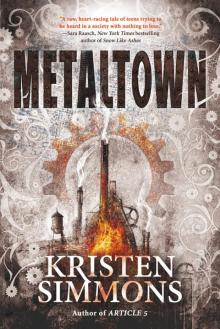 Metaltown
Metaltown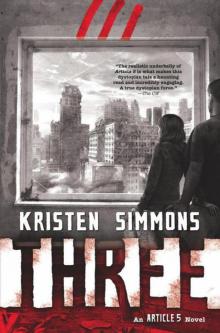 Three
Three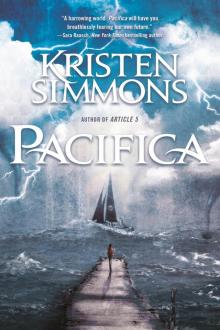 Pacifica
Pacifica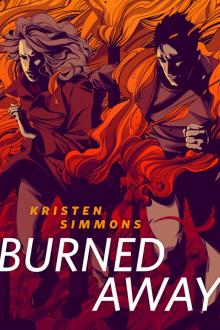 Burned Away
Burned Away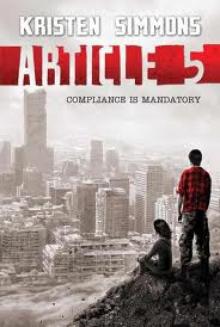 Article 5
Article 5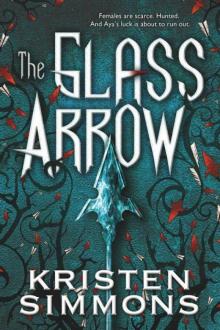 The Glass Arrow
The Glass Arrow Breaking Point
Breaking Point Scammed
Scammed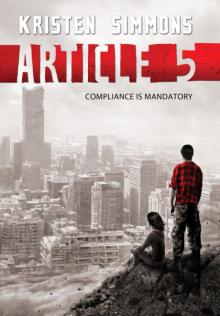 Article 5 a5-1
Article 5 a5-1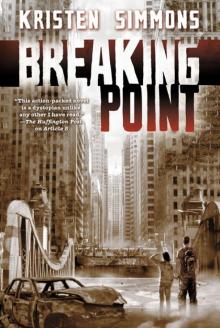 Breaking Point a5-2
Breaking Point a5-2